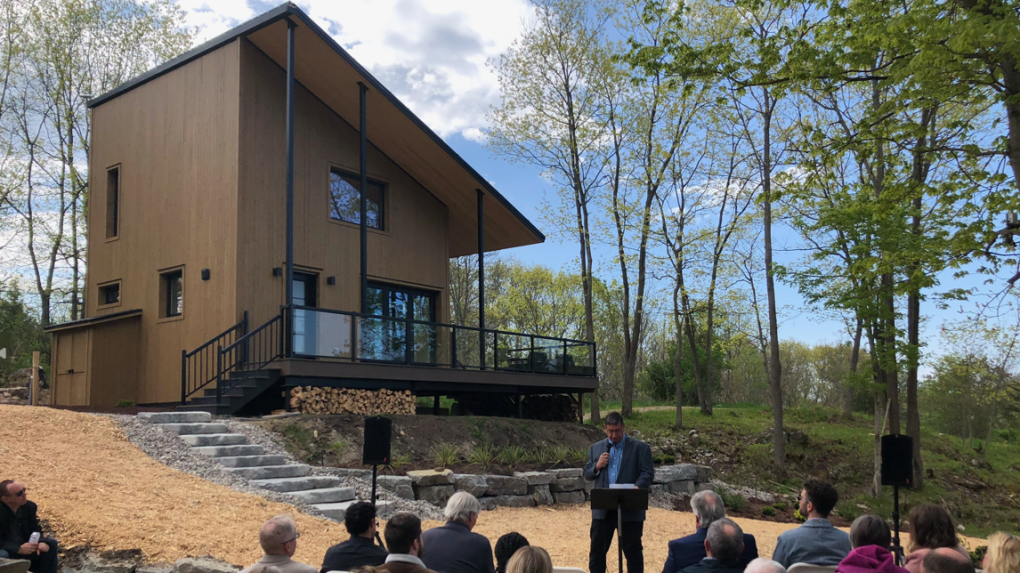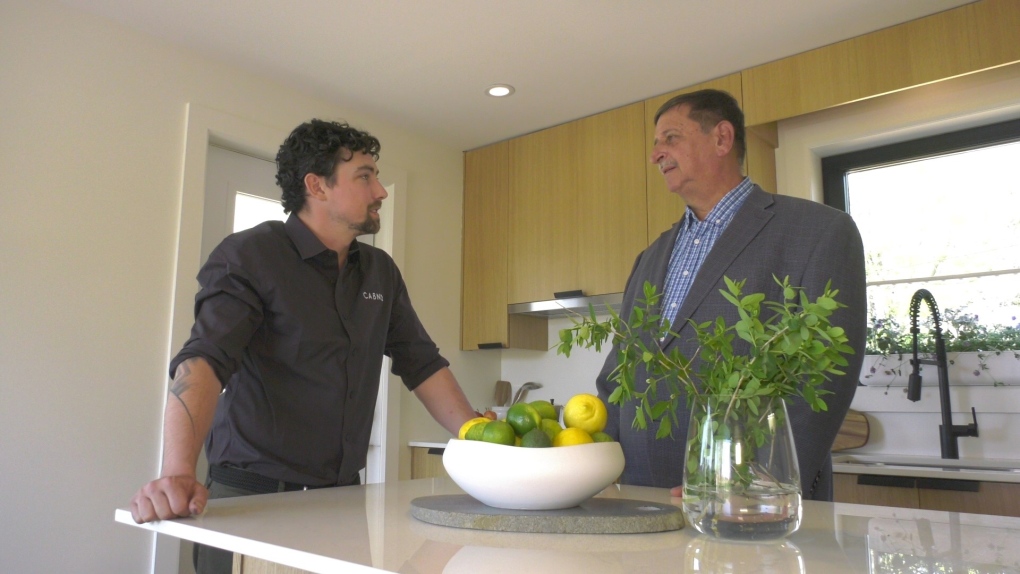Canadian homebuilder unveils net zero, energy efficient home near Brockville, Ont.
Canadian company CABN has unveiled a new model home near Brockville, Ont. to try to combat the affordable housing crisis.
Located near Mallorytown, these homes could be popping up in nearby communities very soon.
"CABN utilizes energy informed design to make the most efficient single-family homes in North America," CEO Jackson Wyatt he told CTV News Ottawa. "It uses one fifth the energy."
Wyatt says the company is on a mission to make housing affordable for all, building prefabricated homes that generate more energy than they consume, and reducing their impact on the environment.
"The CABN ships to your site; you've got your steel framed foundation established and with a crane and two guys or girls, you can actually put together the building in 3 to 5 days," Wyatt said.
"They come with the ability to achieve net zero; so it comes with your solar array systems, your mechanical systems, basically everything that controls the energy of the home, cladding, flooring, windows, all comes in the package, but allows you to get going right, sustainably."
The 750-square-foot model on Larue Mills Road was built in January over two days during a snowstorm, he said.
It's totally off grid and uses solar power, and according to Wyatt, it can generate 200 per cent of the energy it consumes annually.
"Even in those harsh winter months, with the short days and the snowy panels, you'll have far enough energy to be happy and healthy," he said.
The model home will be used as a research and development hub for the company, and to demonstrate that they can be built in any environment.
"This is a testing site that is essentially on a slope, on a cliff," Wyatt said.
"It is a true testament on probably the worst case that you'd have to build one, so that we can tell our customers that this is worst case, it's going to be easier for you," he said.
 Augusta Township Mayor Jeff Shever speaks at the unveiling of the CABN home near Mallorytown, Ont. (Nate Vandermeer/CTV News Ottawa)
Augusta Township Mayor Jeff Shever speaks at the unveiling of the CABN home near Mallorytown, Ont. (Nate Vandermeer/CTV News Ottawa)
The company also announced that they are in talks with Augusta Township to build an off-grid, net zero community featuring 67 of these types of homes.
"We are desperate for housing in our township," said Augusta Township Mayor Jeff Shaver.
"We've had three companies in the last four months that are moving into our township," he noted. "One is 25 employees, they are going to be hiring, one is 50 and one is up to 400."
Shaver says he has been in talks with Wyatt about the project for the past three years, and the homes will range in size from a small 540-square-foot unit, to a 1,800-square-foot, three-bedroom unit.
He says three plots of land being considered are near Maynard; some the municipality owns, and also some privately owned land.
"They are all good locations. They are in a small community of about 30 houses, a school, so it's kind of a perfect setting," Shaver said.
"We are in between Toronto, Montreal, down from Ottawa and it's somewhere someone can come and take a look at the community," he added.
"This cluster is a scalable model for any community across Canada to increase their housing capacity," added Wyatt.
"Using these buildings as a network of buildings in Augusta Township is really the true apex of what these buildings can achieve," he said. "The proposal for the development utilizes the buildings in clusters of five to eight units, most of them are between the two bedrooms or the four bedrooms."
"These clusters are more efficient and more affordable than any one singular building. They have shared waste and water strategies, and shared energy strategies as well," Wyatt said.
There is no timeline on when the project could get underway, with both men saying talks are ongoing.
 CABN CEO Jackson Wyatt and Augusta Township Mayor Jeff Shaver inside the CABN home near Mallorytown, Ont. (Nate Vandermeer/CTV News Ottawa)
CABN CEO Jackson Wyatt and Augusta Township Mayor Jeff Shaver inside the CABN home near Mallorytown, Ont. (Nate Vandermeer/CTV News Ottawa)
Officials from other municipalities, including Elizabethtown-Kitley and the city of Brockville, were also at the unveiling, excited to see what can be done to combat the housing crisis.
Wyatt says the key demographics for these types of sustainable homes are couples looking to downsize, individuals who want to live rurally and have a more balanced life with remote work or small families.
"The problem with affordable, sustainable housing is people think they are too far apart," Wyatt said. "If you design properly and design with efficiently and affordability in mind, and then you design also with energy and sustainability in mind, technology can bridge the gap and allow you to build affordable and sustainable housing."
"The technology exists, we're just taking advantage of it," he added.
Prices for the four sizes of CABN homes range from $220,000 to $500,000.
"It's a huge opportunity to be able to build on beautiful sites without damaging them as well," Wyatt said. "Keeping the trees, keeping the landscape, being non-invasive, that's where our first customers are coming from."
The homes are prefabricated with partners in Ontario and Quebec, and warehousing and processing happens in Brockville and Leeds & Grenville.
"Every object in the home has a sustainable focus. Every step from raw materials to shipping to assembly," he said. "And we hope to continue to build this business in Leeds and Grenville."
Wyatt calls himself a serial sustainability entrepreneur, and previously founded the Dragons’ Den-approved company Greenlid, which developed compostable alternatives to single-use plastics.
With that company sold, he leveraged this environmental passion and advanced manufacturing expertise into CABN's innovative solutions to the housing crisis.
"It's actually been really exceptional. I think everyone behind me, many of them participated in this whole process, whether it's the trades to the R&D team to our suppliers," Wyatt said.
"Our hope when you experience this model home is that you get excited on what's accomplishable with the technology that you truly can live sustainably, and honestly be surprised with the quality of life and the health and happiness," he said.
He said units are already being built, and are expected to ship to buyers in four U.S. states this summer.
The Mallorytown model home is open to the public for viewings, and people looking for more information or to book a tour, can do so through their website.
CTVNews.ca Top Stories

B.C. tenants evicted for landlord's use after refusing large rent increase to take over neighbouring suite
Ashley Dickey and her mother rented part of the same Coquitlam duplex in three different decades under three different landlords.
Mountain guide dies after falling into a crevasse in Banff National Park
A man who fell into a crevasse while leading a backcountry ski group deep in the Canadian Rockies has died.
Expert warns of food consumption habits amid rising prices
A new survey by Dalhousie University's Agri-Food Analytics Lab asked Canadians about their food consumption habits amid rising prices.
MPP Sarah Jama asked to leave Ontario legislature for wearing keffiyeh
MPP Sarah Jama was asked to leave the Legislative Assembly of Ontario by House Speaker Ted Arnott on Thursday for wearing a keffiyeh, a garment which has been banned at Queen’s Park.
Charlie Woods, son of Tiger, shoots 81 in U.S. Open qualifier
Charlie Woods failed to advance in a U.S. Open local qualifying event Thursday, shooting a 9-over 81 at Legacy Golf & Tennis Club.
Ex-tabloid publisher testifies he scooped up possibly damaging tales to shield his old friend Trump
As Donald Trump was running for president in 2016, his old friend at the National Enquirer was scooping up potentially damaging stories about the candidate and paying out tens of thousands of dollars to keep them from the public eye.
Here's why provinces aren't following Saskatchewan's lead on the carbon tax home heating fight
After Prime Minister Justin Trudeau said the federal government would still send Canada Carbon Rebate cheques to Saskatchewan residents, despite Saskatchewan Premier Scott Moe's decision to stop collecting the carbon tax on natural gas or home heating, questions were raised about whether other provinces would follow suit. CTV News reached out across the country and here's what we found out.
Montreal actress calls Weinstein ruling 'discouraging' but not surprising
A Montreal actress, who has previously detailed incidents she had with disgraced Hollywood producer Harvey Weinstein, says a New York Court of Appeals decision overturning his 2020 rape conviction is 'discouraging' but not surprising.
Caleb Williams, Jayden Daniels and Drake Maye make it four NFL drafts with quarterbacks going 1-3
Caleb Williams is heading to the Windy City, aiming to become the franchise quarterback Chicago has sought for decades.
































